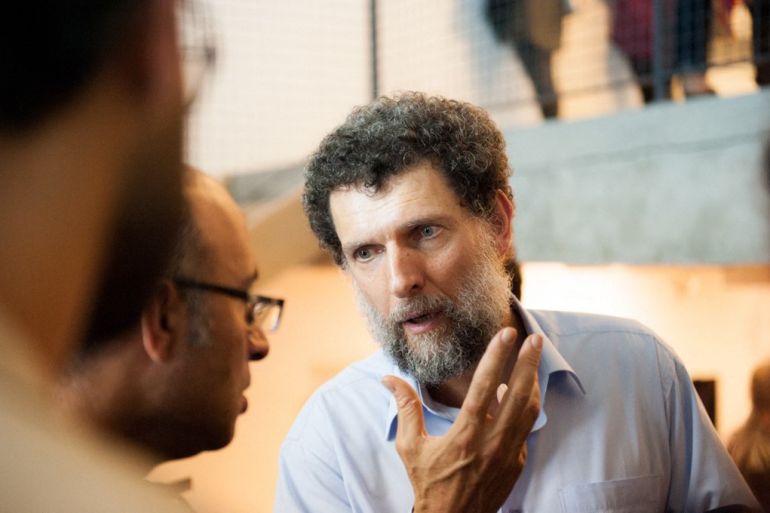Turkey issues rebuke to 10 Western embassies over Kavala case
Ankara summons envoys over the joint call for the release of Osman Kavala, a philanthropist who has been jailed without conviction since 2017.

Istanbul, Turkey – Turkey has summoned the ambassadors of 10 Western nations to lodge its complaint with them over a joint statement calling for the release of Turkish philanthropist Osman Kavala.
Kavala, 64, has been in prison since October 2017, and is currently being tried on a range of charges including espionage and attempting to overthrow the government, stemming from alleged involvement in the 2013 Gezi protests and the 2016 coup attempt. He denies the allegations.
Keep reading
list of 3 itemsErdogan says Turkey in talks with US on sale of F-16 fighter jets
Turkey’s lira sinks to new low with little reprieve in sight
Kavala’s trial has been condemned by Turkish and international human rights groups, and the European Court of Human Rights (ECHR) has ordered his release.
Late on Monday, the fourth anniversary of Kavala’s detention, the embassies of the United States, Canada, France, Finland, Denmark, Germany, the Netherlands, New Zealand, Norway and Sweden released a rare joint statement calling for his immediate release.
“The continuing delays in his trial, including by merging different cases and creating new ones after a previous acquittal, cast a shadow over respect for democracy, the rule of law and transparency in the Turkish judiciary system,” the statement said.
Joint rebuke
On Tuesday, the ambassadors arrived at the Turkish foreign ministry in Ankara and met Turkish officials for about 20 minutes to hear a rare joint rebuke of Western diplomats.
The foreign ministry said in a statement after the meeting that the diplomats had “crossed the line” of acceptable diplomatic behaviour by issuing the statement calling for Kavala’s release.
“This statement attempts to politicise the legal process and pressure the Turkish judiciary, the rule of law, and democracy, which the ambassadors claim to be defending.”
The foreign ministry went on to say there was a “double standard” in the way Turkey was being singled out for not implementing decisions from the ECHR.
In February 2020, a Turkish court acquitted Kavala of charges he was behind the 2013 Gezi protests. But hours after the decision prosecutors levelled new charges, accusing the philanthropist and human rights activist of being part of a conspiracy with US-based scholar Fethullah Gulen, who Ankara blames for orchestrating a failed 2016 coup.

This year, Kavala’s case was merged with that of 51 other defendants, including a group of football fans in Istanbul, accused of trying to violently overthrow the government during the 2013 Gezi protests.
Kavala is one of Turkey’s best-known human rights activists, and his work focused on issues like Turkish-Armenian relations and Kurdish minority rights, some of the most politicised rights issues in the country.
He is also the founder member of the Turkish chapter of the Open Society Foundation.
Kavala’s notoriety has, as a result, drawn interest from Western nations over the years, and diplomats have usually attended hearings as a sign of solidarity.
Kavala has called the charges against him “properly surrealist fiction”, and said in particular the accusation he could have been involved in the 2016 coup attempt was impossible.
“My life experience, my world views and ethical values do not allow me to support coups,” he said in previous court hearings.
ECHR orders ignored
The ECHR has repeatedly ordered Turkey to drop the charges against Kavala and release him, but Ankara has not implemented those orders.
Turkey, which has long sought to become a member of the European Union, is a member of the Council of Europe, and a signatory to the ECHR, and thus required to follow the court’s rulings.
The Council of Europe’s Committee of Ministers is due to meet at the end of November to decide whether to formally start infringement proceedings against Turkey over its refusal to drop the charges.
If the body asks the court to formally declare Turkey in violation, the council could then vote to suspend Turkey’s membership.
Turkey would become the second country, after Azerbaijan, to ever face such proceedings in the Council of Europe.